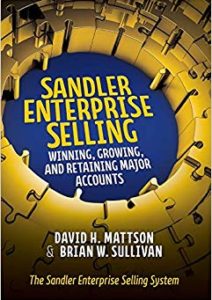I hate to provide such a negative title for an article but I’m a big fan of being real, especially when it comes to selling, especially enterprise selling. We live in a task-driven world, highlighted by starts and stops, defined beginnings and defined endings. And we find comfort in the modularity of our lives, knowing when to enter and when to exit. It characterizes our days, our projects and even our lives from birth to death.
But what about selling and that iconic question – “When does the sale end?”. In simplest terms, Wikipedia tells us “When the desired outcome is achieved”, “When the signature has been gained” or “When the check is received”, to which many would add “….and cashed!”. And there’s certainly logic in these fundamental answers, especially in the transactional world of selling to small and medium-sized businesses. But we wouldn’t typically seek such critical guidance from Wikipedia, would we?
For such a game-changing question, we’d likely investigate published sales processes used by real selling organizations to discover how their programs conclude. We’d want to know all about their last stages. So, we’d Google the topic to find some interesting information that hypothetically provides the elusive answer to our question. What are some of those defined last steps in selling processes? How about “Close”, “Generate Referrals”, “Negotiate/Close”, “Deal”, “Book” and “Follow Up”? Interesting? Perhaps to some. And maybe this type of input, tactical and self-serving as it is, might be helpful as somewhat of a roadmap. But a very elementary roadmap for the world of transactional selling only. For in selling to and serving large enterprise accounts, ending with stages such as these would, no doubt, be the final step. The final step in a lost sale. Delete it from the CRM and move on.
I mentioned that, human nature being what it is, we find comfort in tidily wrapped tasks. Our comfort zones love defined beginnings and endings. But as the quote says, “A comfort zone is a beautiful place. But nothing ever grows there”.
So, what about enterprise selling and its complex world of long sales cycles, wide buyer networks and sophisticated competitors? Such a challenging environment tolerates no comfort zones. For it calls on selling teams to bring nothing but their very best to every account, every opportunity and every touchpoint. In truth, enterprise selling has no end. T.S. Eliot’s timeless quote sums it up well – “To make an end is to make a beginning. And the end is where you start”. How true. For the end of your first successful pursuit with a new enterprise account is actually the beginning. Because enterprise accounts are ecosystems unto themselves – teeming fields of rich, dark, moist soil awaiting the seeds of growth. And your win – the successful “end” of that first sale, opens the gates for the planting of those seeds and the “beginning” of a long-term, client-focused relationship.
Consider the Sandler Enterprise Selling program. It’s structured in six stages, not unlike the processes mentioned earlier. Stage Six – “Service Delivery”, doesn’t even begin until after the business is won and the account relationship has started. Service Delivery, then, is not the end at all. In fact, Sandler Enterprise Selling has no end. Why? Because enterprise relationships are based on a continuous process of selling and delivering through streams of transactions over time. That’s the enterprise world.
Sounds beautiful, right? But much can go wrong. There’s the dreaded handoff from sales to delivery. As part of a “detach with an ax” strategy, clumsy handoffs choke account growth and confuse clients. Then there are the inflexible sales and delivery siloes that often stifle communication and collaboration. Your sophisticated competitors, always lurking, will take advantage of organizational weaknesses like these, strategizing diligently to steal your business away. Be assured, enterprise selling is not for the faint of heart.
Practically speaking, how do you make it work? Effective selling organizations operationalize the continuous process not by promoting occasional communication between the sales and delivery teams but by integrating them into a single, collaborative, client-focused unit – the “account team”. Delivery is actively involved in sales pursuits, increasing the probability of winning through “delivering while selling”. And sales understands and engages in delivery initiatives, managing account relationships to maximize service successes and client satisfaction – “selling while delivering”. True partnering in the account team is the bedrock of true partnering with the account.
So, with enterprise accounts, when does the sale end? Never. No happy endings. No endings at all. But very happy futures for selling teams that base their account strategies on the long term. Even more importantly, for those that make it their mindset. Believe in the continuous process of selling and delivering and show it in your every action with the account. You’ll stay and you’ll grow as a result.












Comments (1)
My take home is from T.S. Eliot’s timeless quote “To make an end is to make a beginning. And the end is where you start”.
An opportunity is like a seed which when grown and norished through every stage in the sales cycle, closes(ends) as the beginning of multiple opportunities (referrals/recommendations).
Enterprise selling is a “never ending story”.
Thanks Brian Sullivan for this great writeup.